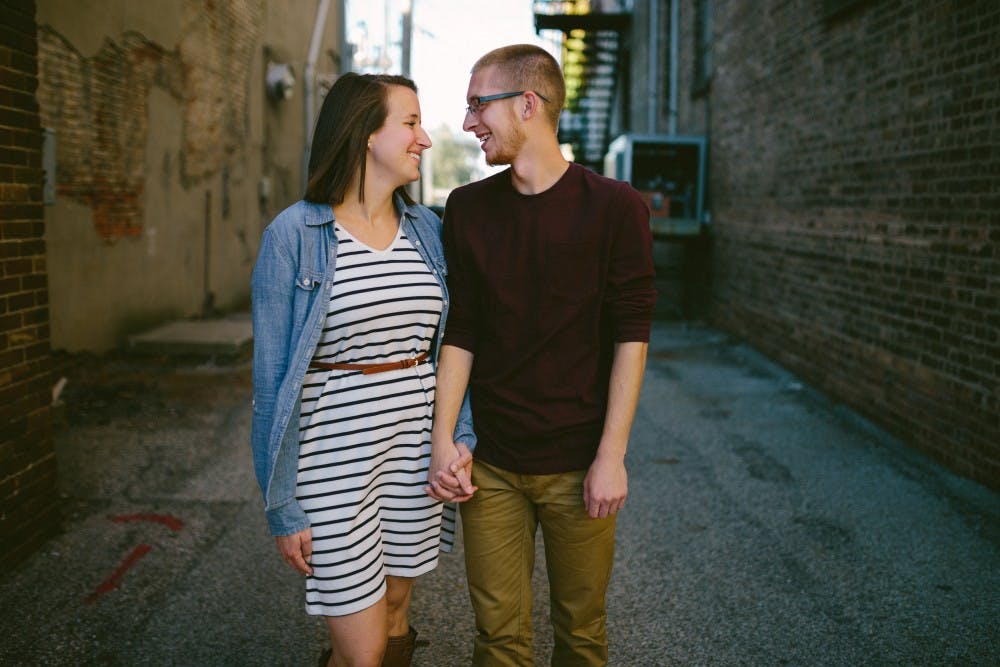Zane Bishop and Courtney Stetzel sit on separate chairs, but the slight distance doesn’t hinder their connection. They’re clearly on the same wavelength, just stopping short of finishing each other’s sentences.
Stetzel and Bishop got engaged a month-and-a-half ago after dating for one year and nine months. They’re both Ball State seniors — Bishop an urban planning major and Stetzel a marketing major.
The couple will get married shortly after graduation. They've known they've wanted it that way for a while.
“We sought a lot of advice from people who would be honest with us and wouldn’t tell us what we wanted to hear,” Stetzel said.
Chadwick Menning, an associate professor of sociology, said that quick engagements are not a current trend in society.
“There was a period after World War II when people were getting married very young, and often after very brief courtships, but those trends have shifted over time,” he said.
The reason for the shift is partly due to people focusing on their own careers before marriage, Menning said.
Stetzel and Bishop haven’t abandoned their future aspirations. They’ve just taken a different route than their peers.
“We knew we would rather pursue our careers together rather than apart. We knew that we could still reach our personal goals as a married couple,” Stetzel said. “I think it will cause us less stress, because we get to be married to each other while working on our careers. … I'm excited to support my best friend as he pursues things he is really passionate about.”
Dating has changed over time, too. There are new stages, and people are getting to know each other differently, like by hanging out in a group or meeting on online dating sites, Menning said.
“Netflix and chill” has become the new dinner-and-a-movie for some.
“Repeated hookups with the same person often lead to a move by one partner or the other to define the relationship, so hooking up is not necessarily as distinct from dating as we might believe,” Menning said.
Stetzel and Bishop are happy with their impending marriage, but some college students' engagements don’t work out.
Erin Bau, a junior philanthropy major at Indiana University - Purdue University Indianapolis, had been dating her boyfriend for two years when they got engaged.
“We moved in together and got a dog, and it felt like the next step. We both wanted to show each other that we were serious about each other and our future together,” she said.
The engagement lasted only three months, but Bau said she doesn’t regret it at all.
There were many reasons they didn’t stay together, she said.
“We moved into an apartment that was pretty small and we were both stressed, so that caused issues. … We also changed a little bit over the summer and wanted different things from each other,” Bau said.
Kelsey Smith, a sophomore art education major, is a bit skeptical of quick engagements.
“I mean, you love who you love, but coming from someone who's been in a relationship for three years, … it takes a while to actually know someone and everything about them,” she said.
Bishop and Stetzel experienced some of that skepticism when they got engaged.
Most of Bishop’s family supported the move, but some said they were “too young.” Anyone who really knew the couple was fine with the engagement, he said.
“You just have to prioritize your happiness. … Do what’s best for you as a couple. Your relationship is where you have to live,” Stetzel said.
Getting married before age 20 and engagements of fewer than six months increase the risk of divorce, Menning said, but so do engagements that last more than three years.
“Beyond this, though, we need to be careful not to assume too much about people’s end goals," he said. "Marriage may remain the ideal for many people, but people are also increasingly cohabiting or single."
In 1996, 2.9 million unmarried couples lived together, according to the U.S. Census. In 2012, that number increased to 7.8 million.
Alyssa Humburg has been married since August, after an eight-month engagement to her now-husband Dylan Humburg.
The two Ball State students dated a year before tying the knot, but Alyssa said that they had been seriously thinking about marriage six months into their relationship.
“We truly knew that we wanted to spend forever with each other. When you know, you know. In our mind, we knew we would get married eventually, so why not sooner than later,” Alyssa said.
The Humburgs didn’t live together during their engagement. Alyssa lived in the dorms.
“I did stay at his house with his roommates a lot,” she said. “ I think that it helped our relationship grow quicker because we were around each other more. We knew what we liked and disliked with our habits and we learned to love every quirk.”
Stetzel and Bishop won’t live together until they’re married either. That might not be until next June — the month they have planned for their wedding.
“We’re really involved in our church. That influenced our decision on not living together, but we aren’t critical of people who live together, and we also realize that not everyone holds the same belief as us,” Stetzel said.
Relationship trends didn’t sway Bau from getting engaged, and even though her relationship didn’t last, she doesn’t think that should affect what other couples choose to do.
“I think the important thing [for couples] is knowing themselves, knowing a little bit better of how it’s going to go,” she said.





